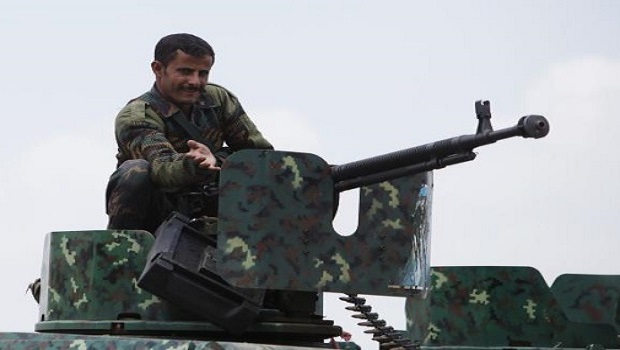
A police trooper mans a machine gun on an armoured personnel carrier positioned near the British Embassy in Sanaa August 18, 2013. REUTERS/Khaled Abdullah
Colonel Ali Hadi, the Political Security Department chief in Aden, the largest city in southern Yemen, was shot dead in a terrorist attack in the center of the city. His nephew was also killed in the same attack.
The killing of Colonel Hadi is thought to be the latest of a series of assassinations of security figures by Al-Qaeda, although the Yemeni government has yet to announce the results of investigations into any of the attacks.
The Yemeni air force on Wednesday carried out surveillance flights over southern areas of Yemen, especially the governorate of Hadramout. Local sources told Asharq Al-Awsat that the surveillance flights were aimed at updating the positions of Al-Qaeda amid fears by officials that the organization was planning to attack the strategic city of Al-Mukalla, in order to take control there.
Yemeni sources said more than 30 members of Al-Qaeda have been killed by American drone attacks in the past two weeks. Al-Qaeda has been trying to take control of Hadramout for the past two months, drawing attacks by the Americans to stop them achieving their aims.
Meanwhile, the Yemeni government has reiterated its resolve to fight terrorism. The Yemeni prime minister’s media and political adviser, Ali Al-Sarari, told Asharq Al-Awsat that “the government had a strong stance against terrorism because this government did not use the war on terror as a tool to plot and scheme, and that it was a government which knew that terrorism was the danger which needed to be confronted with full force and resolve, in opposite to what the previous regime used to do. The previous regime did not see Al-Qaeda as a threat to its existence, it saw the opposition as the real threat to its existence.”
The Yemeni official accused the old regime of “making deals with Al-Qaeda to use them against its political enemies, and sometimes to pressure Western parties. When asked to carry out real attacks on terrorism, we found [the previous government] raising slogans calling for dialogue and trying to bring the terrorists onside to control them without a real war to confront them.”
The adviser said: “this issue was now over, and the government is totally serious about fighting terrorism and has achieved important results, especially in the Ibbin governorate and nearby areas where Al-Qaeda had a large and public presence. Any new moves by Al-Qaeda will have to be confronted with force to put an end to their danger.”
In another development, Yemeni President Abd Rabbo Mansour Hadi has been trying to contain the deteriorating situation in Damaj, in the Saada governorate. Houthis and Salafists have clashed again in Damaj in the last two days, with the Houthis using artillery to bombard the area.
Hadi yesterday met members of the committee which is tasked with resolving the problems in Damaj. He said: “The country is living through extraordinary circumstances and there is a comprehensive national dialogue which includes all constituents of Yemeni society without exception.”
Yemeni news agency SABA quoted Hadi as saying: “the differences and the sticking points are on the comprehensive national dialogue table and everyone must adhere to that,” adding that “Yemen today is about to turn a new page, and the world is watching Yemen with admiration as the only country which has allowed the logic of dialogue, to defeat the logic of war, hatred and murder.”
